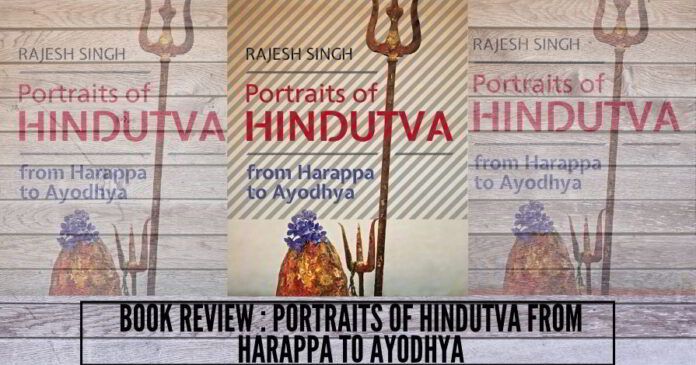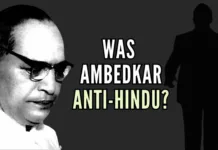
The author explains the thin line that exists between Hinduism and Hindutva, both of which are modern day constructs
Hear us, o Agni, in your common dwelling:
Harness thy rapid car of amrta.
Being heaven and earth, the Deities’ parents, hither:
Stay with us here, nor from the Gods be distant
Rig Veda …
Thus is sown the seed of Hinduism. Through the invent of Agni the fire.
Hinduism or Hindutva wasn’t developed overnight.. it was a state of continuum evolving as it journeyed.
Portraits of Hindutva, from Harappa to Ayodhya traces the growth of what has today become a deeply polarizing issue. The author Rajesh Singh, recounts events that shaped the phenomenon and talks of the personalities that were its torchbearers.
The book beautifully explores the evolution of the term Hindutva – from religious to spiritual to political, spanning centuries, beginning from Indus valley civilization to contemporary times, specifically to the Ayodhya belligerence.
The author explains the thin line that exists between Hinduism and Hindutva, both of which are modern day constructs. According to the author, they are mere terminologies which are reflective of traditions and beliefs that millions of people in the Indian subcontinent shared since many centuries. First came the word Hindu, then Hinduism and thereafter Hindutva in the popular narrative. The geographical location of the inhabitants decided their religion in ancient times but it has lost much relevance today, given that borders have changed dramatically since those ancient times and large patches of land have now metamorphosed into different nations where Hinduism doesn’t hold pre-eminence.
The bhakti movement comprised of bhakti poets who found new ways to interpret the religion without disturbing the old order is the real accomplishment according to the author
Why is it so important to trace the origin of Hinduism?
The author feels there is a heightened awareness about Hindu identity coupled with a renewed eagerness to lay hands on the basics of the epics and scriptures that proudly claim the Hindu credentials. So he regards it his responsibility to portray the Hindutva in its honest hue.
The author speaks of proponents of Hindutva who were faced with near extinction in the early 1980s. Secularism was introduced in the preamble to the constitution, and populism was borne. So a new wave arose, with saffron streak holding the cudgels of the restoration of the ancient religion through crafting a renewed Hindutva in order to expose appeasement politics.
The book is a good read and holds high relevance in current political turmoil. It starts with the sown seeds, followed later by creating a niche, to the formation of an organisation to a current restoration of the faith.
The chapter on the bhakti movement resonates the secret sound the real sound which is within.. the self.
The bhakti movement comprised of bhakti poets who found new ways to interpret the religion without disturbing the old order is the real accomplishment according to the author. It was an important landmark as it was an expression of individualized internal feelings: at another, it was a manifestation of a collective sigh for change. These were the ‘surrendered‘ ones. Thus bhakti era vociferously engaged the common man from all walks of life, immersed them in the divine bliss and knowledge.
To conclude, the author quotes Jeanette Winterson,
you cannot disown what is yours, Flung out,
There is always the return, the reckoning, the
Revenge, perhaps the reconciliation”.
Note:
1. The views expressed here are those of the author and do not necessarily represent or reflect the views of PGurus.
- The Scarlet Horizon: Sri Krishna and the feminine energy he believed could stop the war! - March 2, 2023
- ‘Jabberwockiers’ book review: Tender yet Turbulent - March 9, 2022
- An audience with Anant Pai in the true sense… - August 14, 2021










